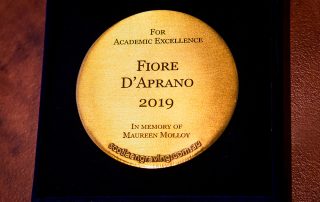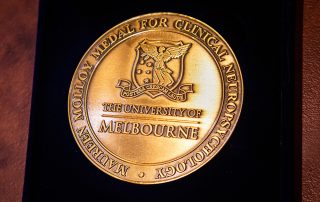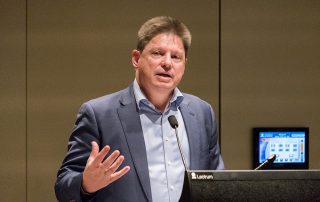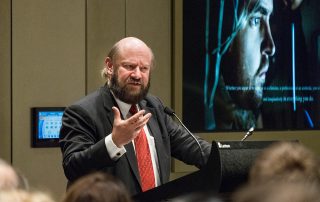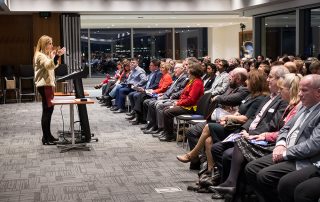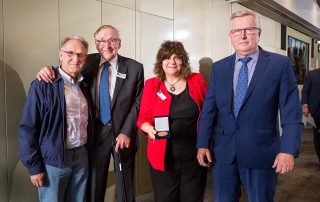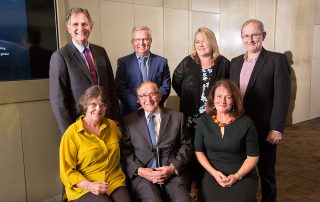Maureen Philomena Molloy
Maureen Molloy (1925 – 2011) was a leading clinical and forensic  neuropsychologist in Melbourne. As a scientist and psychologist with diverse and modern interests and as an expert witness in the courts she blazed an important trail for women.
neuropsychologist in Melbourne. As a scientist and psychologist with diverse and modern interests and as an expert witness in the courts she blazed an important trail for women.
On 25 July 1946 she graduated with a BSc (Hons) from the University of Sydney, the only female graduate in her year. She went on to be appointed as a Lecturer in Physics, a rare achievement for a woman at the time. She married and bore seven children between 1951 and 1963, the last of whom had a severe intellectual disability.
She returned to tertiary study and successively was awarded a BA (Hons) (1975) in psychology, an MA (1977) and a PhD (1984) in psychology, all from the University of Melbourne. Her PhD, supervised by Dr Kevin Walsh AO, was on “Memory Outcome Following Blunt Head Injury”. It reviewed a sample of 150 patients who had sustained blunt trauma injury to the head and studied the sequelae of bilateral damage to their frontal-temporal-limbic structures. She concluded that deficits in the organisational aspects of memory are evidenced by tendencies to perseverate in errors and to lack flexibility in patterns of responding and in the feedback from errors, despite ongoing correction from such errors. This suggested to her the presence of cognition processing disorders related to attentional functions and to the organisational aspects of memory.
While she was working as a neuropsychologist at the Austin and St Vincent’s hospitals, as well as in the Commonwealth Rehabilitation Centre at Glen Waverley, Dr Molloy set up a company to provide rehabilitation for people suffering brain injuries from transport and workplace accidents. Ultimately, her practice specialised in the diagnosis and measurement of acquired brain injury and she came to be recognised as one of Australia’s leading private practitioners in the field.
Dr Molloy had a particular interest in the use of computers to aid rehabilitation from brain injury. She published a book on the subject in 1988 with Julie Ann Garner Neuropsychological Rehabilitation: Recovery from Brain Injury (Spectrum, Melbourne) and in 1995 completed a Master of Science degree at the University of Melbourne in cognitive neuroscience, focussing upon the use of artificial intelligence systems to model brain function. Her thesis focused upon the feasibility of developing a computer-based diagnostic advisory system with the potential to provide reliable assistance in the prediction of outcome for patients who had sustained head injuries. In the years after her thesis she explored computer-generated options for assessing the neuroplasticity of the brain and models for assessing recovery from brain injury after traumatic injuries.

The Maureen Molloy Medal
The Maureen Molloy Medal recognises the contributions of Dr Maureen Molloy, a pioneering Australian forensic neuropsychologist and lawyer. After training initially as a physicist, Dr Molloy completed honours, masters and PhD degrees at the University of Melbourne before working as a clinical neuropsychologist at the Austin and St Vincent’s hospitals. She was renowned for her expertise in the diagnosis, assessment and cognitive rehabilitation of acquired brain injury. In addition to clinical and extensive expert witness work in this area, Dr Molloy also published influentially on it.
Rewire Ltd, Melbourne University and the family and friends of Dr Molloy have endowed an annual prize called the “Maureen Molloy medal”. The prize, a medal and an associated cash award, will be awarded to a high-achieving student in the Melbourne School of Psychological Sciences’ professional training program in clinical neuropsychology.
Contributions to the Maureen Molloy Fund are tax deductible and, amongst other things, result in the award each year, commencing in 2017, of the Rewire Maureen Molloy Medal to the leading graduate in the Masters degree in Psychology (Clinical Neuropsychology) at the University of Melbourne.
Dr Molloy’s entry into neuropsychology was at an important early phase of the development of the discipline in Australia. She developed an extensive network of professional contacts throughout Australia and overseas. She was a regular participant in neuropsychology conferences internationally.
As Dr Molloy’s forensic career developed, she became the favoured neuropsychologist for plaintiff lawyers in Victoria, and beyond. She was a powerful and clear communicator to students, those whom she mentored, and to barristers, solicitors and judges in her role as a forensic expert.
Late in her career Dr Molloy returned to part-time study and in 2006, at the age of 80, she was awarded a Bachelor of Laws degree by Deakin University. She continued in practice until the year prior to her death, continuing to assess the nature and extent of brain injuries from diverse sources, including from heavy metal poisoning.

Eligibility
All students in the Master of Psychology (clinical neuropsychology) program at the University of Melbourne who have completed all course requirements during the calendar year in which the prize is awarded.
Dr Molloy was a voracious reader and a great lover of music, ranging from opera and ballet to musical theatre and popular music. She had a quotation from Shakespeare or Gilbert and Sullivan for every occasion.
Maureen Molloy was a self-effacing person with a particular aptitude for empathy, humanity and compassion. She was an incisive interpreter of people and issues but was driven by the spirit of altruistic inquiry and a desire for rigorous scientific evaluation. Although she had a formidable scholarly career, and had an analytical mind that spanned multiple areas of discourse within psychology and the sciences, she particularly enjoyed her contact with individual patients and their family members who had experienced adverse consequences from traumatic events.
Dr Molloy made a host of professional and personal contributions. These included a legacy of technical skill and expertise as a neuropsychologist and scientist, pioneering work as a cross-disciplinary scholarly researcher, assistance to the courts as an expert witness and report-writer, determined advocacy on behalf of her clients, and the provision of unwavering support to her family, friends and professional colleagues.

Selection Criteria
The prize will be awarded to the student with the highest average mark across all components of the degree (i.e., 200 points including all coursework and thesis subjects, with marks weighted by the points value of the subjects concerned). In the event of a tie, the cash award will be split and more than one medal awarded.

Rewire Ltd is Australia Charities and Not-for-profits Commission registered.
ABN 28 602 590 492.
Donations of $2 or more to Rewire are tax deductible in Australia.

Selection Process
Selection will be overseen by a senior academic within the School, appointed by the Head of School, who will check eligibility and the marks calculation. A subcommittee composed of that academic and a representative of the funding group will then review and ratify the recommended recipient of the award.

Value
An annual award of $1,500 and a suitably designed medal will be given to the prize winner at a suitable ceremony.
Inaugural Winner
 Maureen Molloy Medal Winner 2017
Maureen Molloy Medal Winner 2017
The Melbourne School of Psychological Sciences recently hosted the inaugural Master of Psychology Awards and Networking Event. Congratulations go to Georgia Bolt in recognition of her outstanding academic achievement in the Master of Psychology (Clinical Neuropsychology) program.
Program partner
Maureen Philomena Molloy
Maureen Molloy (1925 – 2011) was a leading clinical and forensic  neuropsychologist in Melbourne. As a scientist and psychologist with diverse and modern interests and as an expert witness in the courts she blazed an important trail for women.
neuropsychologist in Melbourne. As a scientist and psychologist with diverse and modern interests and as an expert witness in the courts she blazed an important trail for women.
On 25 July 1946 she graduated with a BSc (Hons) from the University of Sydney, the only female graduate in her year. She went on to be appointed as a Lecturer in Physics, a rare achievement for a woman at the time. She married and bore seven children between 1951 and 1963, the last of whom had a severe intellectual disability.
She returned to tertiary study and successively was awarded a BA (Hons) (1975) in psychology, an MA (1977) and a PhD (1984) in psychology, all from the University of Melbourne. Her PhD, supervised by Dr Kevin Walsh AO, was on “Memory Outcome Following Blunt Head Injury”. It reviewed a sample of 150 patients who had sustained blunt trauma injury to the head and studied the sequelae of bilateral damage to their frontal-temporal-limbic structures. She concluded that deficits in the organisational aspects of memory are evidenced by tendencies to perseverate in errors and to lack flexibility in patterns of responding and in the feedback from errors, despite ongoing correction from such errors. This suggested to her the presence of cognition processing disorders related to attentional functions and to the organisational aspects of memory.
While she was working as a neuropsychologist at the Austin and St Vincent’s hospitals, as well as in the Commonwealth Rehabilitation Centre at Glen Waverley, Dr Molloy set up a company to provide rehabilitation for people suffering brain injuries from transport and workplace accidents. Ultimately, her practice specialised in the diagnosis and measurement of acquired brain injury and she came to be recognised as one of Australia’s leading private practitioners in the field.
Dr Molloy had a particular interest in the use of computers to aid rehabilitation from brain injury. She published a book on the subject in 1988 with Julie Ann Garner Neuropsychological Rehabilitation: Recovery from Brain Injury (Spectrum, Melbourne) and in 1995 completed a Master of Science degree at the University of Melbourne in cognitive neuroscience, focussing upon the use of artificial intelligence systems to model brain function. Her thesis focused upon the feasibility of developing a computer-based diagnostic advisory system with the potential to provide reliable assistance in the prediction of outcome for patients who had sustained head injuries. In the years after her thesis she explored computer-generated options for assessing the neuroplasticity of the brain and models for assessing recovery from brain injury after traumatic injuries.
Dr Molloy’s entry into neuropsychology was at an important early phase of the development of the discipline in Australia. She developed an extensive network of professional contacts throughout Australia and overseas. She was a regular participant in neuropsychology conferences internationally.
As Dr Molloy’s forensic career developed, she became the favoured neuropsychologist for plaintiff lawyers in Victoria, and beyond. She was a powerful and clear communicator to students, those whom she mentored, and to barristers, solicitors and judges in her role as a forensic expert.
Late in her career Dr Molloy returned to part-time study and in 2006, at the age of 80, she was awarded a Bachelor of Laws degree by Deakin University. She continued in practice until the year prior to her death, continuing to assess the nature and extent of brain injuries from diverse sources, including from heavy metal poisoning.
Dr Molloy was a voracious reader and a great lover of music, ranging from opera and ballet to musical theatre and popular music. She had a quotation from Shakespeare or Gilbert and Sullivan for every occasion.
Maureen Molloy was a self-effacing person with a particular aptitude for empathy, humanity and compassion. She was an incisive interpreter of people and issues but was driven by the spirit of altruistic inquiry and a desire for rigorous scientific evaluation. Although she had a formidable scholarly career, and had an analytical mind that spanned multiple areas of discourse within psychology and the sciences, she particularly enjoyed her contact with individual patients and their family members who had experienced adverse consequences from traumatic events.
Dr Molloy made a host of professional and personal contributions. These included a legacy of technical skill and expertise as a neuropsychologist and scientist, pioneering work as a cross-disciplinary scholarly researcher, assistance to the courts as an expert witness and report-writer, determined advocacy on behalf of her clients, and the provision of unwavering support to her family, friends and professional colleagues.

The Maureen Molloy Medal
The Maureen Molloy Medal recognises the contributions of Dr Maureen Molloy, a pioneering Australian forensic neuropsychologist and lawyer. After training initially as a physicist, Dr Molloy completed honours, masters and PhD degrees at the University of Melbourne before working as a clinical neuropsychologist at the Austin and St Vincent’s hospitals. She was renowned for her expertise in the diagnosis, assessment and cognitive rehabilitation of acquired brain injury. In addition to clinical and extensive expert witness work in this area, Dr Molloy also published influentially on it.
Rewire Ltd, Melbourne University and the family and friends of Dr Molloy have endowed an annual prize called the “Maureen Molloy medal”. The prize, a medal and an associated cash award, will be awarded to a high-achieving student in the Melbourne School of Psychological Sciences’ professional training program in clinical neuropsychology.
Contributions to the Maureen Molloy Fund are tax deductible and, amongst other things, result in the award each year, commencing in 2017, of the Rewire Maureen Molloy Medal to the leading graduate in the Masters degree in Psychology (Clinical Neuropsychology) at the University of Melbourne.

Eligibility
All students in the Master of Psychology (clinical neuropsychology) program at the University of Melbourne who have completed all course requirements during the calendar year in which the prize is awarded.

Selection Criteria
The prize will be awarded to the student with the highest average mark across all components of the degree (i.e., 200 points including all coursework and thesis subjects, with marks weighted by the points value of the subjects concerned). In the event of a tie, the cash award will be split and more than one medal awarded.

Selection Process
Selection will be overseen by a senior academic within the School, appointed by the Head of School, who will check eligibility and the marks calculation. A subcommittee composed of that academic and a representative of the funding group will then review and ratify the recommended recipient of the award.

Value
An annual award of $1,500 and a suitably designed medal will be given to the prize winner at a suitable ceremony.

Rewire Ltd is Australia Charities and Not-for-profits Commission registered.
ABN 28 602 590 492.
Donations of $2 or more to Rewire are tax deductible in Australia.
Inaugural Winner
 Maureen Molloy Medal Winner 2017
Maureen Molloy Medal Winner 2017
The Melbourne School of Psychological Sciences recently hosted the inaugural Master of Psychology Awards and Networking Event. Congratulations go to Georgia Bolt in recognition of her outstanding academic achievement in the Master of Psychology (Clinical Neuropsychology) program.

